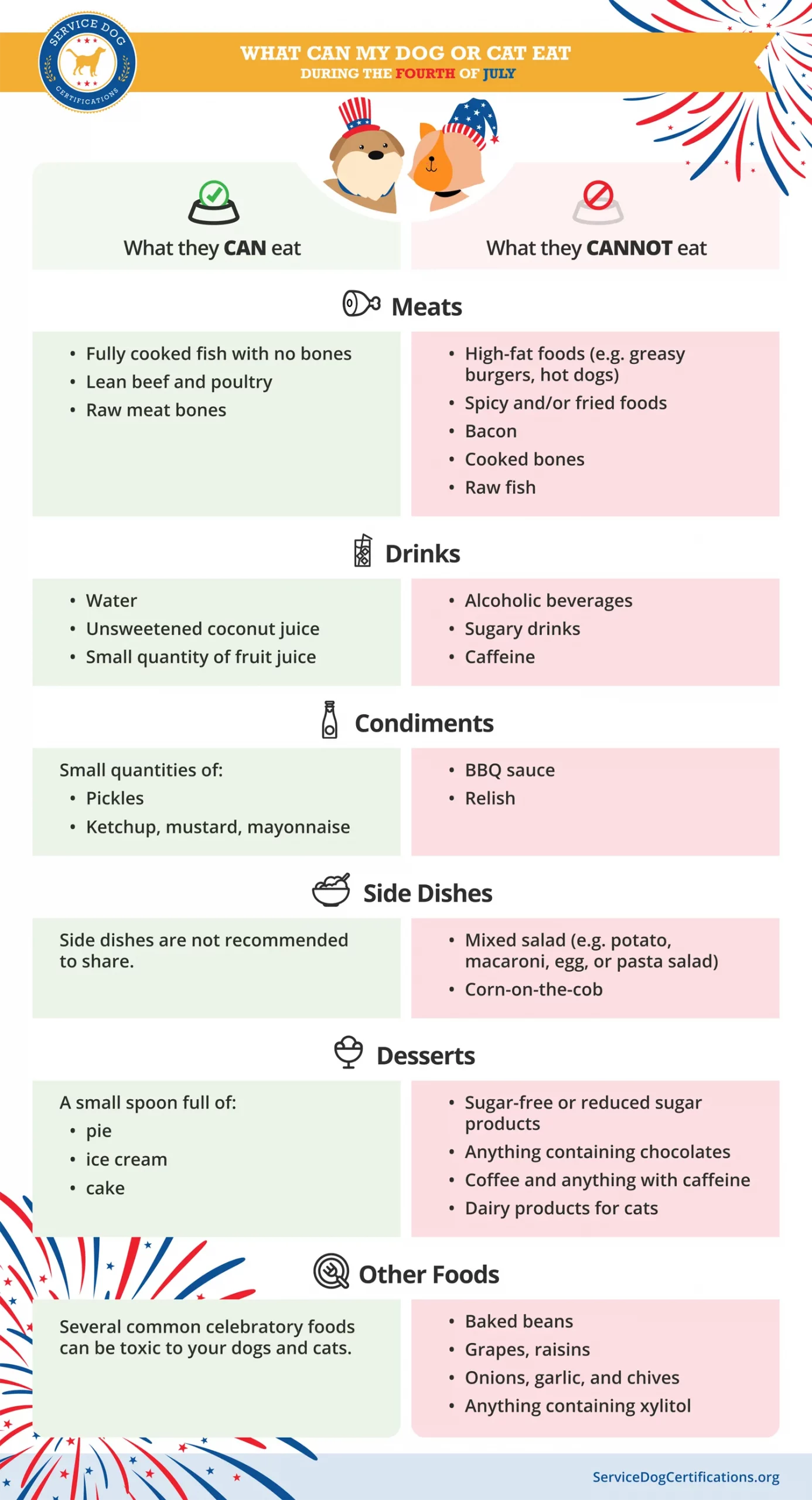Fourth of July Pet Safety: What Can My Dog or Cat Eat?
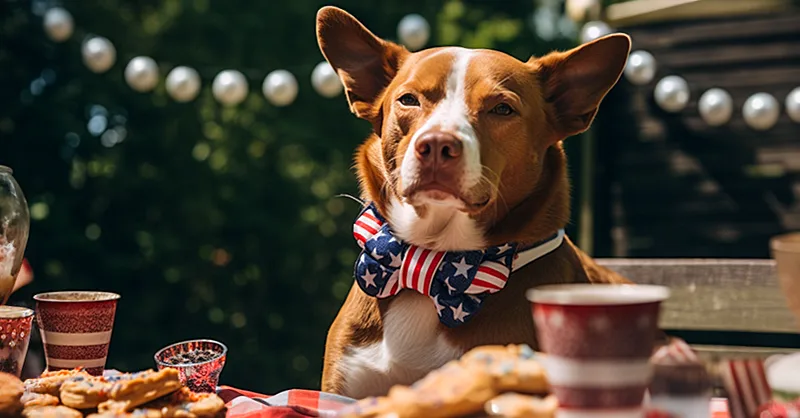
Your dog is probably going to beg for food at your Fourth of July party. Your cat might try to sneak a taste of something when nobody’s looking. Most of the time, a little bite won’t hurt them, but sometimes it will.
Veterinarians have seen too many pets end up sick because someone didn’t know that onions are in almost everything we eat at BBQs. Or that chocolate isn’t the only dangerous thing on the dessert table. The worst part is watching a family rush their dog to the emergency vet on a holiday when the whole thing could have been avoided.
You don’t need to keep your pets locked away from the party. You just need to know which foods will actually hurt them and which ones are fine.
In this article:
- The foods that will hurt them
- Safe options for your pets
- Beverages
- Why cats and dogs are different
- When things go wrong
Share this image on your site
The Foods That Will Hurt Them
BBQ Meats
Your guests are going to love those greasy burgers and hot dogs. But your pets shouldn’t have them. The ASPCA Animal Poison Control Center sees cases of pancreatitis from high-fat foods all the time. Think of pancreatitis as your pet’s pancreas getting angry and inflamed; it’s painful and can be dangerous.
Here’s something that might surprise you: one hot dog for a 20-pound dog is like three hamburgers for you. That’s way too much fat and salt for a little body to handle.
Onions and Garlic
This one catches people off guard, onions and garlic are in almost every BBQ dish you can think of. Potato salad? Usually has onions. BBQ sauce? Definitely contains garlic. Even that seasoning blend on your grilled vegetables probably has onion powder.
The problem is that onions, garlic, chives, and their relatives cause serious damage to your pet’s red blood cells. It leads to anemia, which means their blood can’t carry oxygen properly. Cats are especially sensitive to this, but dogs can also become ill.
Chocolate and Other Sweets
Everyone knows dogs should not eat chocolate, but coffee and caffeinated drinks are just as dangerous. They all contain something called methylxanthines. When pets eat these compounds, they can get hyperactive, have heart problems, and even have seizures.
Dark chocolate and baking chocolate are the worst. If your dog gets into your s’mores supplies, that could mean an emergency vet visit.
Watch out for xylitol too. It’s an artificial sweetener in sugar-free gum, mints, and some diet foods. It can cause your dog’s blood sugar to crash dangerously fast.
Grapes and Raisins
These might seem harmless, but they’re not. Veterinarians recommend keeping grapes away from dogs. Scientists recently figured out that tartaric acid in grapes is likely what damages dogs’ kidneys. Dogs can’t process this acid the way humans can. Even a few grapes can cause kidney failure. Keep an eye out for raisins as well, hiding in trail mix, cookies, and fruit salads at parties.
Salads
Potato salad, macaroni salad, and coleslaw almost always contain onions. Sometimes it’s diced onions mixed right in. At other times, it’s onion powder blended into the dressing. Either way, your pets shouldn’t have any.
Be sure to ask the hosts about ingredients before your dog gets near any mixed salad. Many people don’t think to mention the onions because they seem like such a small part of the recipe, but even that small amount can hurt your pet.
If the salad has any seasoning beyond salt and pepper, it probably has onion or garlic powder. If it’s a family recipe passed down through generations, there are probably onions in it. When you’re not sure, keep your pets away.
The same goes for pasta salads, bean salads, and those fancy grain salads people bring. Most contain onion family ingredients somewhere. Even store-bought versions usually have onion powder in the dressing.
Corn on the Cob
The corn kernels won’t hurt your pet. But the cob will. Dogs love to grab whole cobs and chew them like bones. Cats sometimes get curious, too.
Corn cobs don’t break down in your pet’s stomach. Large pieces get stuck in their intestines and can’t move through. Dogs sometimes need emergency surgery to remove cob pieces. It’s painful, expensive, and totally preventable.
If you’re serving corn, strip the kernels off before throwing the cob away. Put bare cobs in a covered trash can where pets can’t reach them. Ask guests to bring their finished cobs to you instead of tossing them wherever.
Baked Beans
Baked beans hit your pets with three problems at once. First, they’re loaded with sugar. Some recipes use molasses, brown sugar, and corn syrup in the same pot. That much sugar upsets stomachs and can trigger pancreatitis in dogs.
Second, most baked bean recipes include onions and garlic. Check the ingredient list on any can of baked beans. You’ll see onion powder listed. Homemade versions often start with sautéed onions as the flavor base.
Third, beans themselves cause digestive upset. Even without the sugar and onions, a big helping of beans can give your pet gas and stomach discomfort.
Condiments
BBQ sauce tastes amazing because it’s loaded with onions, garlic, sugar, and salt — all things your pets shouldn’t have. The same goes for the fancy mustard and the homemade ketchup your neighbor brought.
Even mayonnaise can be problematic. It’s high in fat, and when it sits out in the heat, it can spoil and make your pet sick. If you want to give your pet a little taste of something, make it plain. No sauces, no seasonings, no condiments. We know it sounds boring, but their taste buds work differently from yours anyway.
Spicy Foods
Fourth of July parties mean jalapeño poppers, chili-rubbed steaks, and Flaming Hot Cheetos. Your pets can’t handle the heat like you can. Spicy foods can cause stomach upset, diarrhea, and excessive drooling.
The problem is capsaicin — that’s the chemical that makes peppers spicy. Veterinarians say capsaicin can cause gastrointestinal distress in both dogs and cats, including vomiting, diarrhea, and oral irritation. For dogs, even small amounts can cause flatulence, stomach upset, and more serious symptoms like persistent vomiting.
Cats can get mouth and nose irritation from spicy foods, and if they groom themselves after touching something spicy, the oils can sting their eyes.
Safe Options for Your Pets
Plain Grilled Meats Work Best
Your pets can join the party safely. Give them small pieces of plain grilled chicken breast or lean beef: no seasonings, no marinades, no butter. Just meat, cooked through, and cooled down.
Cut off pet portions before you start marinating. Season your portion after setting theirs aside. This keeps everyone happy.
Fish works too, but removing bones takes patience. Salmon and cod work best because you can see their bones easily. Skip anything with tiny bones, they can get caught in your pet’s throat. Cook pet portions a little longer than yours and let everything cool completely before serving.
Vegetables Most Pets Enjoy
Plain grilled zucchini, carrots, and green beans are a good option. Keep it plain — no oil, no garlic, no seasoning salt.
Sweet potatoes become instant favorites when cooked plain. Cut them into wedges and grill alongside your regular vegetables. Most dogs love them. Bell peppers appeal to pets who like crunchy textures, but be sure to remove all seeds first.
Skip onions, garlic, mushrooms, and tomatoes altogether.
Beverages
Your dog doesn’t need to drink a whole beer to get sick. Even a few licks of spilled wine can cause problems. Alcohol affects pets much more intensely than it affects us because of their smaller body size.
Alcoholic beverages can cause vomiting, diarrhea, difficulty breathing, tremors, and even death in pets. We’ve all heard stories about dogs who seemed fine after getting into beer, but that doesn’t mean it’s safe. Some pets show delayed reactions.
Watch out for foods cooked with alcohol, too. That beer can chicken or wine-braised beef still contains alcohol even after cooking. The alcohol doesn’t completely evaporate like many people think.
You’ll also want to be mindful of drinks with caffeine, which are ever present at Fourth of July events. Coffee isn’t the only concern here. Energy drinks pack way more caffeine than coffee. Sweet tea might seem harmless, but it often contains as much caffeine as soda. Even chocolate milk has some caffeine from the cocoa.
Caffeine contains the same methylxanthines found in chocolate that can cause hyperactivity, heart problems, and seizures in pets. Hot summer days make iced coffee drinks especially tempting to leave around where curious pets can reach them.
Keep an eye on coffee grounds. Some dogs will eat used grounds right out of the trash. Coffee grounds contain concentrated caffeine and can cause serious problems.
Fresh, clean water beats any fancy drink you could offer your pet. Put out extra water bowls during parties, especially on hot July days. Pets get thirsty from all the excitement and heat.
Change the water in their bowls more often than usual. Party chaos means people walking near water bowls, kids playing around them, and general commotion that can contaminate the water more quickly.
Why Cats and Dogs Are Different
Cats are much more likely to be lactose intolerant than dogs. Most adult cats can’t produce enough of the enzyme needed to digest milk and dairy products. Dogs sometimes can, sometimes can’t.
Both cats and dogs can get sick from onions and garlic, but cats are much more sensitive. A small amount that might just give a dog an upset stomach could seriously hurt a cat.
The smaller your pet, the less it takes to make them sick. One grape might not bother a 70-pound Lab, but it could put a 10-pound cat in serious trouble.
When Things Go Wrong
Watch for vomiting, diarrhea, excessive drooling, weakness, or your pet acting strangely. If they seem drunk or unsteady, that’s a red flag. Difficulty breathing is always an emergency.
If your pet ate something they shouldn’t have, call your vet or the ASPCA Animal Poison Control Center at (888) 426-4435. Don’t wait to see if they get sick. Time matters with poisoning.
Don’t make your pet throw up unless a veterinarian tells you to. Some things are more dangerous coming back up than staying down.
If your dog ate half a chocolate cake, save the wrapper or take a picture of what’s left. The vet needs to know exactly what and how much they ate.
For emergencies, contact your veterinarian or the ASPCA Animal Poison Control Center at (888) 426-4435. This information is for educational purposes and doesn’t replace professional veterinary advice.
About the Author: The writing team at Service Dog Certifications is made up of folks who really know their stuff when it comes to disability laws and assistance animals. Many of our writers and editors have service dogs themselves and share insights from their own experiences. All of us have a passion for disability rights and animals.
Latest Posts
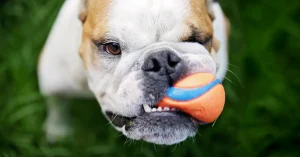
Dangerous Materials Hiding in Your Dog Products
Jake’s German Shepherd began developing strange rashes around his collar. Three vet visits later, they figured out the leather was treated with chromium — a chemical that irritates sensitive skin. Jake had no idea his dog’s collar contained industrial chemicals. Most dog owners don’t know what goes into the products they buy. Many companies use […]

Read More
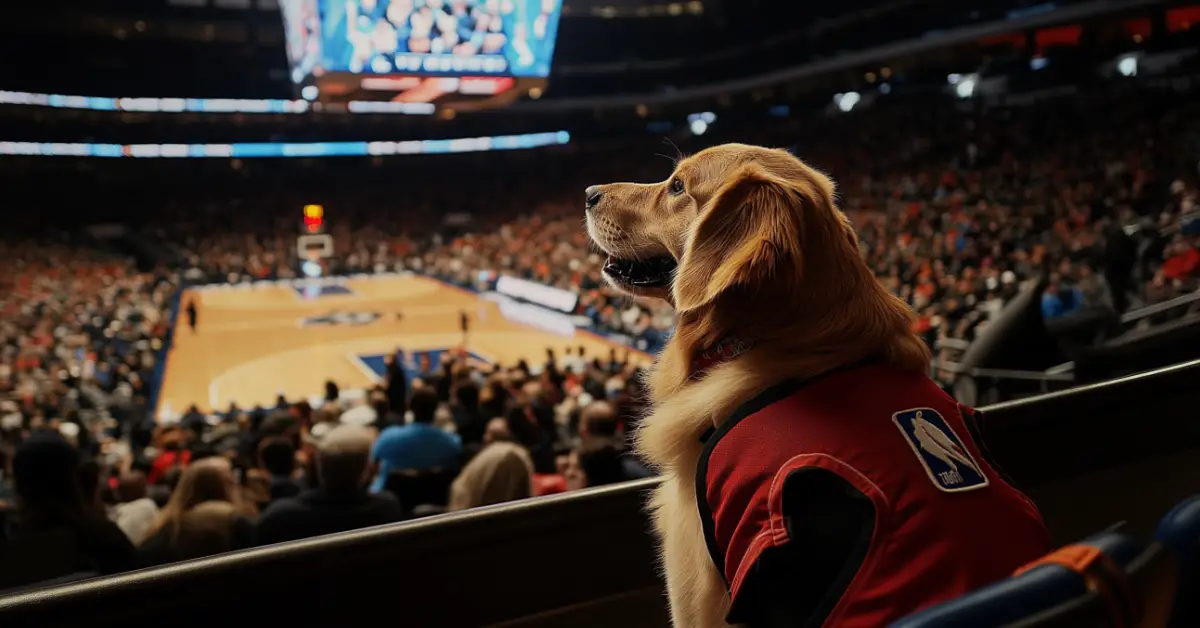
Can You Bring a Service Dog to a Basketball Game?
Yes, you absolutely can bring your service dog to basketball games. Whether you’re heading to your local high school tournament, a packed college rivalry game, or splurging on NBA tickets, the Americans with Disabilities Act protects your right to be accompanied by your service dog anywhere the public can go. When you arrive, venue employees […]

Read More
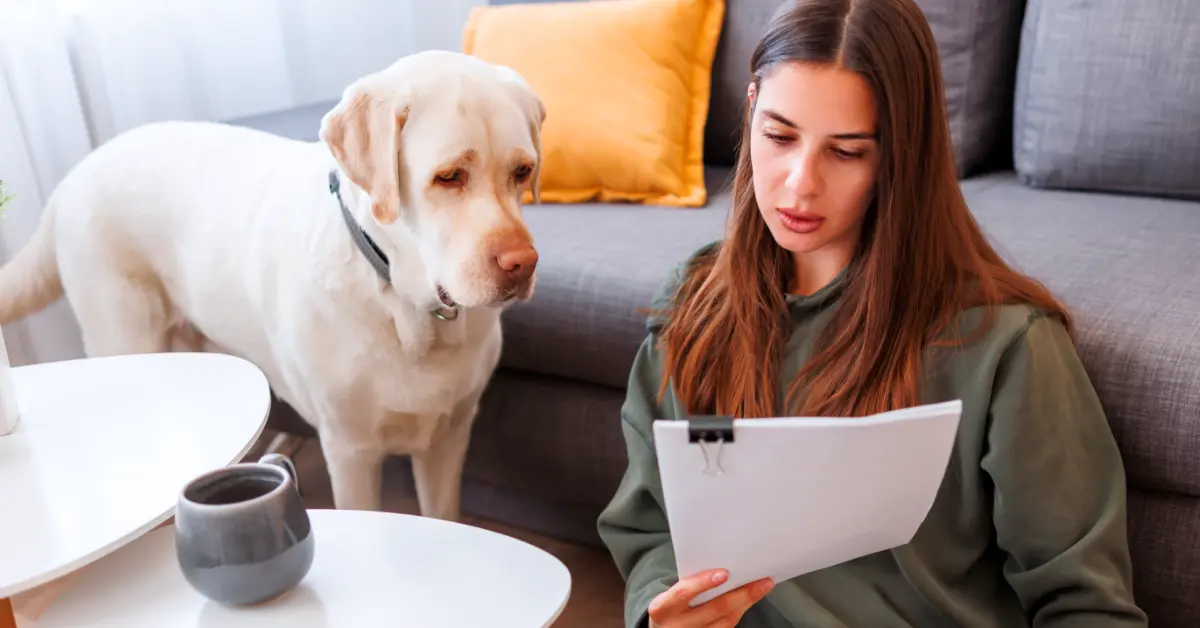
Best Pet Health Insurance Providers
If you own a pet, you know how important — and expensive — vet care can be. One way to offset those costs is to purchase pet health insurance. Like typical health insurance, pet insurance is available at many price points, and can cover all, most, or only some of your vet-related costs. It can […]

Read More
